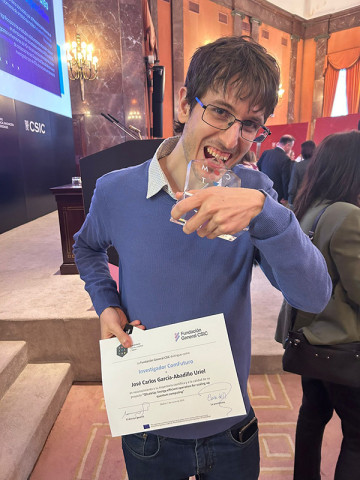José Carlos García-Abadillo Uriel gets ComFuturo distinction

To promote young research talent within Spain. To promote people dedicated to scientific research who can return to our country, develop their research careers within our borders, and have a present and a future. How to achieve it? The General CSIC Foundation proposes to do so through public-private collaboration thanks to the ComFuturo program, now in its third edition.
This year, one of the projects that has reached one of the 16 distinctions is the one from José Carlos García-Abadillo Uriel, a researcher at the Material Science Institute of Madrid (ICMM-CSIC). His story is clearly linked with the purpose of ComFuturo: he obtained a Cum Laude in his doctoral thesis at the ICMM; then he went as a postdoc to the United States and France, and he has been able to come back to Spain thanks to this distinction.
He García-Abadillo's project is a disruptive research in the quantum computing field. "Quantum computing has enormous potential to impact areas such as chemistry and cybersecurity. However, the real potential of quantum computers will only be achieved when the number of cubits they use, which are the fundamental unit of information in quantum computers, can be scaled up efficiently", says the researcher about his project: 'QScaleUp'.
"A large-scale quantum computer would require thousands of these units, which in turn would require large amounts of energy to operate, which is why it is essential to find optimal scaling platforms and methods. The QScaleUp project focuses on investigating a particular type of quantum processor platform, one based on the manipulation of spin cubits in semiconductors, which significantly reduces the power requirements for manipulation and, potentially, cooling. This gives it clear advantages as a scalable and energy-efficient platform in the development of powerful and sustainable quantum computers".
Eloísa del Pino, president of the CSIC, defended last Thursday, the day of delivery of the ComFuturo badges, that with this project the institution "increases its pool of young and international talent, capable of opening lines of disruptive and transferable research to the productive fabric and to the society". In addition, she celebrated that talent is being trained that, in addition, "will end up in national research centers or in companies."
Integrated into the Marie Skłodowska-Curie European actions, ComFuturo "aspires to generate a pool of researchers with scientific profiles of excellence, capable of proposing innovative solutions to major challenges of society, who at the same time show capabilities and initiatives for knowledge transfer, innovation and entrepreneurship," explains the Foundation itself. In its first edition, two researchers from the Madrid Institute of Materials Science (ICMM) achieved one of its distinctions: Íñigo Bretos and Felipe Gándara.
Instituto de Ciencia de Materiales de Madrid (ICMM)
Sor Juana Ines de la Cruz, 3
Cantoblanco, 28049
Madrid, España
Telephone: (+34) 91 334 90 00
Email: @email
Communication Office: @email

Acknowledge the Severo Ochoa Centres of Excellence program through Grant CEX2024-001445-S/ financiado por MICIU/AEI / 10.13039/501100011033

Contacto | Accesibilidad | Aviso legal | Política de Cookies | Protección de datos
